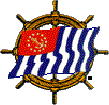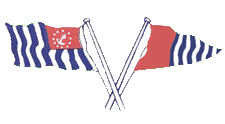 |
|
|
|---|---|---|
Flag and Etiquette Committee
|
Do It Right! |
|
|
|
||
International Signal Flags

The following flags are international signals used by ships at sea. Complete information can be found in DMAHTC Pub 102, International Code of Signals (1969 Edition, Revised 2003) which was adopted by the Fourth Assembly of the Inter-Governmental Maritime Consultative Organization in 1995.
Signal flags provide a way to communicate information relating to safety, distress, medical, and operational information, especially when language difficulties arise. Each flag has a unique and complete meaning
Single-letter signals are used for urgent and important issues, or issues of very common use. Two-letter and three-letter signals are used for other messages.
Strung from the forward waterline over the bow to the masthead, then over the stern to the aft waterline, signal flags are used to dress ship for holidays or special occasions.
Old and new USCGC Mackinaws dressing ship
Alphabet flags
 A |
 B |
 C |
 D |
 E |
 F |
 G |
 H |
 I |
 J |
 K |
 L |
 M |
 N |
 O |
 P |
 Q |
 R |
 S |
 T |
 U |
 V |
 W |
 X |
 Y |
|
|
|
 Z |
|
|
Answering Pennant

Close up (top of mast), the receiving vessel indicates she understands the hoist.
At the end of the signal it indicates that the message is complete.
At dip (half masted), hoisted by receiving vessel as each hoist of the transmitting ship is seen.
Numeric Pennant
 0 |
 1 |
 2 |
 3 |
 4 |
 5 |
 6 |
 7 |
|
|
 8 |
 9 |
|
Substitute Pennants
 Substitute 1 |
 Substitute 2 |
 Substitute 3 |
The Navy has different meanings for some signal flags and they use different flags to represent numbers.

|
|
